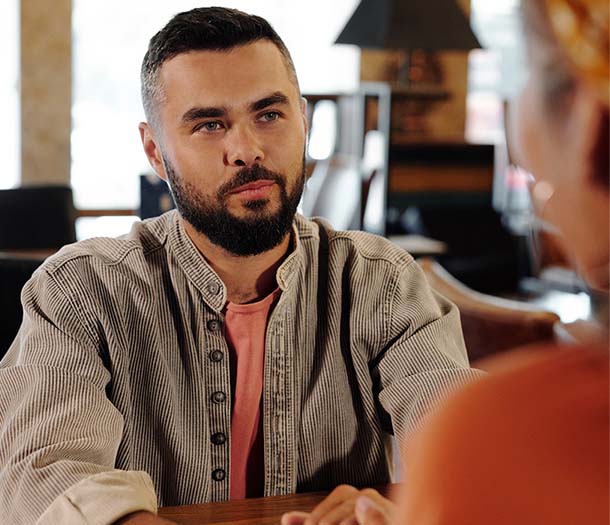
Dating a widower for the first time can feel both exciting and scary. Each person grieves differently, so it’s important to be aware of warning signs.
Understanding the signs of potential issues when dating a widower can ensure a healthy and happy relationship.
It may seem like a horror movie, but being aware of these warning signs is important. So what are the signs to look out for? Keep reading to find out.
Key Takeaways
- When dating a widower who still has strong feelings for their deceased partner, it is crucial to be understanding and patient.
- Before entering into a new relationship, it is crucial to address any unresolved problems and set clear boundaries. This is vital to show respect and honor the memory of their previous partner.
- Look for warning signs such as feeling distant, comparing a new partner to the late spouse, and not wanting to discuss the late spouse.
- Communication is important for addressing these issues and creating fairness between partners. Honest discussions about expectations and boundaries help in this process.
Red Flags Of Dating a Widower
You need to be aware of certain red flags when dating a widower. Avoid hot-and-cold behavior that could leave you feeling ‘on edge’.
Sometimes, widowers have a hard time starting new relationships after their spouse dies. It’s important to notice if they show signs of sadness or if they can’t move forward.
- If your partner is still connected to their deceased spouse, such as talking about them all the time or not wanting any changes in their shared home, it might mean there’s an issue.
- If your date starts blaming you for everything that goes wrong in their life, it may be a sign of a problem.
- They may have unresolved feelings from their previous relationship and still need to make peace with it.
Pay attention to how your partner talks and deals with issues about their ex-spouse. If he talks nicely about his ex but seems comfortable moving forward with you, then you don’t need to worry.
What to Expect Dating A Widower?

When dating a widower, it can be challenging to connect with someone who has experienced the painful loss of a spouse. It is crucial to know what to expect in this situation.
It’s normal for him to still have strong feelings for his partner who passed away. However, he should also be able to start a new relationship and move forward.
He might feel guilty when he finds someone else attractive or starts dating again.
You should reassure him that it’s okay and you’re willing to take things slow.
He may need time alone or time away from your relationship as he works through his emotions. Respect this need and don’t take it personally.
Showing understanding and patience will help him open up more towards you.
However, don’t be too nice or agreeable, or else he might take advantage of you. Trust your instincts and set boundaries when you’re dealing with him.
Related reading: 9 Obvious Signs A Widower Is Serious About Your Relationship
Is It OK to Date a Widower?
Dating a widower can be intimidating, but with empathy and patience, it can be a fulfilling journey.
A widower has already experienced the loss of a partner and could still be grieving the death.
Each person handles grief in their own way, and there’s no specific time for moving on. With an open mind and heart, here are five things to look out for when dating a widower:
Keep in mind that he might still have feelings for his late spouse, which could affect him in certain ways.
- Respect his need for space or time alone.
- Listen patiently as he talks about his past relationship and don’t push him to forget what happened.
- Don’t compare yourself to his previous partner.
- Appreciate the fact that he isn’t afraid of commitment because he has already done it before.
To create a strong bond with your widowed partner, be patient, understanding, and respectful of their feelings. This will help build a healthy relationship based on trust.
Here Are 12 Warning Signs When Dating A Widower

When getting to know a widower, it’s important to be mindful of warning signs that may indicate problems in the relationship.
There are warning signs to watch out for when dating a widower, such as asking too many personal questions at once or becoming distant or defensive during conversations. It’s important to be aware of these red flags.
Watch out for these warning signs in a widower:
- Not being open about their past. Frequently mentioning their late wife.
- Speaking negatively about their late wife.
- Being overly critical of your efforts in the relationship.
- Showing a lack of interest in social activities, and exhibiting unpredictable mood swings.
It’s also important to look out for any signs of physical or verbal abuse.
If you see any signs that someone you’re dating who has lost their spouse is treating you badly, it’s a good idea to pause and think about what’s happening before deciding whether to keep going with the relationship.
Think about whether this person has been honest and supportive. Also, consider if they have shown respect for your feelings.
If not, they will probably continue behaving this way even after getting married.
Be sure that you’re comfortable with them before taking things further.
1). Not Willing to Talk About Late Spouse
If someone is unwilling to talk about their late spouse, it might mean there are unresolved problems that need to be addressed before making a commitment.
Your potential partner may show this in different ways. They might avoid talking about their ex-spouse or become defensive when you ask about them.
Sometimes, it can also extend to other things linked to the deceased partner. For example, the person might avoid going to places they used to visit together or not want to hear stories they shared.
If this is true, the relationship should only advance once you’ve talked about and dealt with those hidden emotions.
It is crucial to set boundaries with your new partner. Make sure they understand the importance of respecting and honoring the memory of their previous spouse, regardless of how long ago they passed away.
If they still feel sad, it’s okay, but it shouldn’t stop them from forming a good relationship with someone new.
2). Emotional or Physical Distance
However, there’s another warning sign to watch out for when dating a widower.
If your partner seems distant or uninterested in sharing their emotions with you, it could be a sign of emotional or physical distance, even though it’s normal for them to still feel connected to their late spouse.
If your partner doesn’t like to touch or talk about their feelings, it could mean they’re not ready for a new relationship.
If he isolates himself and avoids spending time with you, it could be a sign that you are not emotionally compatible.
3). Continuing to Harbor Guilt
Entering a new relationship can be tough for a widowed person due to lingering guilt from their late spouse.
When starting a new relationship, widowers often experience guilt from their late spouse.
They may feel guilty about moving on with someone else or being around someone who reminds them of their lost love.
Sometimes, people hold on to certain feelings or memories without even realizing it. This can happen subconsciously, like in the case of a widower.
When dating someone who struggles to move on from the past, be patient and understanding.
Be open and non-judgmental when they need to talk about their experiences and encourage them to express their feelings.
It’s tough for them, so let them know it’s okay to take time to grieve without feeling rushed.
Tell your partner that you’re there for them in any way they need, and give them emotional support when you can.
4). Unhealthy Attachment to Memories
Staying attached to memories can be harmful for a widower and make it hard for them to fully embrace their new relationship.
If your partner often thinks about the past and talks about their late spouse, it could mean they find it hard to move on from those memories.
After a divorce or the death of your spouse, people might not want to do things that signal progress, like decorating or celebrating holidays in a new way.
Remember, it’s normal to feel this way when you lose someone you love. But if these actions are affecting your relationship, talk openly and honestly about it.

5). Using the Late Spouse as a Comparison
Comparing a new partner to the late spouse is unfair and can cause stress in the relationship. It’s like comparing apples to oranges.
Comparing a new partner to a late spouse might show an unhealthy attachment to memories.
They think of the past in a positive way, which is not good for building healthy relationships in the future.
We need to talk openly about our future expectations and how we can both move forward from the past.
It’s understandable that a widower may find it difficult to completely move on. However, they need to make space for something new if they want their relationship to succeed in the future.
6). You’re Expected to Play the Role of the Deceased Spouse
When you start a relationship with a widower, it’s crucial to set clear boundaries. It can be unfair to expect you to take on the role of their late spouse.
If your partner expects you to do things their late spouse did, like household tasks or social roles, discuss expectations and roles in your relationship.
It might be hard for them to change the habits or routines they had with their late spouse and move forward with you. But they should ask your opinion first and not expect too much from you.
Respectful communication is important when dealing with these issues. It helps create fairness for both partners.
The widower should know that some things can never be replaced in what they shared with their late spouse. It’s important for them to understand this.
7). Being Financially Unstable
If a widower is not financially stable, it can lead to difficulties. It is crucial to be cautious as you navigate the relationship.
If your partner is having money problems, it could mean there are bigger issues that might impact your future together.
It can also bring up feelings of resentment if he’s relying on you to help him out financially. Have a sincere and open talk about his money situation and give help in any way you can.
If your relationship becomes more serious, be sure to set clear boundaries for your finances.
This will help ensure that both of you feel comfortable with the arrangements you make. Understand that this won’t be solved quickly. Do not have high expectations immediately.
8). Refusing to Move On
It can be tough for a widower to move on because they have to face their lingering sadness and guilt. If your partner is stuck in this place, there are certain warning signs you should look out for:
Emotional Warning Signs:
- Refuses to talk about the deceased spouse
- Is distant or emotionally shut off from friends and family
- It is hard for them to express their feelings or talk openly without getting angry or emotional.
Relationship Warning Signs:
- Will not commit to a relationship with you.
- Is unable to make decisions important to the relationship.
- Does not show affection or appreciation towards you.
Behavioural Warning Signs:
- Avoids social activities that involve couples/romance.
- Gets defensive when asked about how they acted or felt regarding their late partner.
- Displays anger, frustration, guilt, and other negative emotions without explanation.
Recognizing these signs is important. You can support and help your partner as they grieve.
If they aren’t ready for commitment yet, they must be honest with themselves and with you about their needs right now.

9). Unmet Expectations
Dating after losing a spouse can be hard when your expectations aren’t met. It’s tough to accept when things don’t go as planned. As the adage goes, “You can’t make someone love you.”
Widowers may not know if their expectations are realistic. They may feel frustrated and resentful when their partner can’t or won’t meet their goals.
It’s vital for both of you to talk openly about what you expect and set clear boundaries that work for both of you.
If you don’t talk honestly about what you expect and set boundaries that work for both of you, it can create tension and resentment. This can lead to an unhealthy relationship.
Effective communication is important for a strong relationship. Make sure to have these conversations early to prevent them from becoming bigger problems later.
10). Avoiding Intimacy
Avoiding intimacy can be a tricky road to navigate, especially after the loss of a spouse. Sometimes, opening up about feelings can be hard for a widower.
- They may be afraid of getting hurt or being vulnerable again.
- He may not be able to trust someone new completely, so he keeps his distance emotionally.
If he experiences this, he might become too protective or avoid talking about personal matters.
If you’re dating a widower and feel like he is avoiding intimacy, don’t push him too far or too fast. Allow him the time needed to heal and build trust with you on his own terms.
Make sure he understands your expectations for communication and physical closeness. Show him that you care, but don’t pressure him into anything he isn’t ready for.
11). Inability to Open Up
Reaching out to your partner can be difficult if they’re unable to open up about their grief. If your partner’s a widower, it may be even harder for them to share their sorrow with you.
It may be hard for them to talk about losing their spouse because of the strong emotions they feel. It’s important for them to feel safe and comfortable in order for them to open up.
If it feels like talking is really hard, it might mean they’re not ready to let go of their old relationship. Understanding and empathizing can make it simpler for them to share their feelings.
Spending quality time together can help build trust and connect both of you.
12). Keeping You in the Dark
When your partner doesn’t share their thoughts and feelings with you, it can be really sad.
If you’re dating a widower who always hides information or won’t talk about their past, it might mean they’re not ready for a new relationship yet.
They may still be grieving for their lost partner and unable to move on emotionally.
Have a truthful talk with them to understand how they feel and if they can express their emotions. This will help you both decide if the relationship is worth pursuing further.
Make sure your partner respects your need for emotional closeness and your right to ask about their past relationships and experiences.
Conclusion
Dating a widower can be tough, but it doesn’t have to be. As long as you keep your eyes open for the warning signs, you can make sure to avoid any major pitfalls.
Take it one day at a time and remember that no relationship is perfect. It’s like the old saying goes: “If you don’t take risks, you won’t reap rewards.”
Think of it as a game of chess. Each move needs strategy and thought. If you do it right, the reward is worth the effort. And with love, that reward is immeasurable.
Frequently Asked Questions
How Long Should I Wait Before Introducing a Widower to My Family?
You should wait until you feel comfortable and confident that it is the right decision.
Be sure to talk openly with your family about any concerns or questions they may have.
What Are the Best Ways to Help a Widower Move On?
Listen with compassion, be patient and understanding. Show support and provide a strong shoulder to lean on during their healing journey.
Should I Expect a Widower to Talk About His Late Spouse?
It’s natural for them to express their feelings and remember the good times they shared.
Be patient and understanding as it can be difficult for them to move on.
What Are Some Healthy Boundaries to Set When Dating a Widower?
Make sure you both feel okay with how much time you spend remembering and honoring the late spouse. Respect each other’s space and emotions.
How Can I Tell If the Widower Is Ready to Date?
Keep an eye on how much effort they invest in the relationship and if it feels equal.
